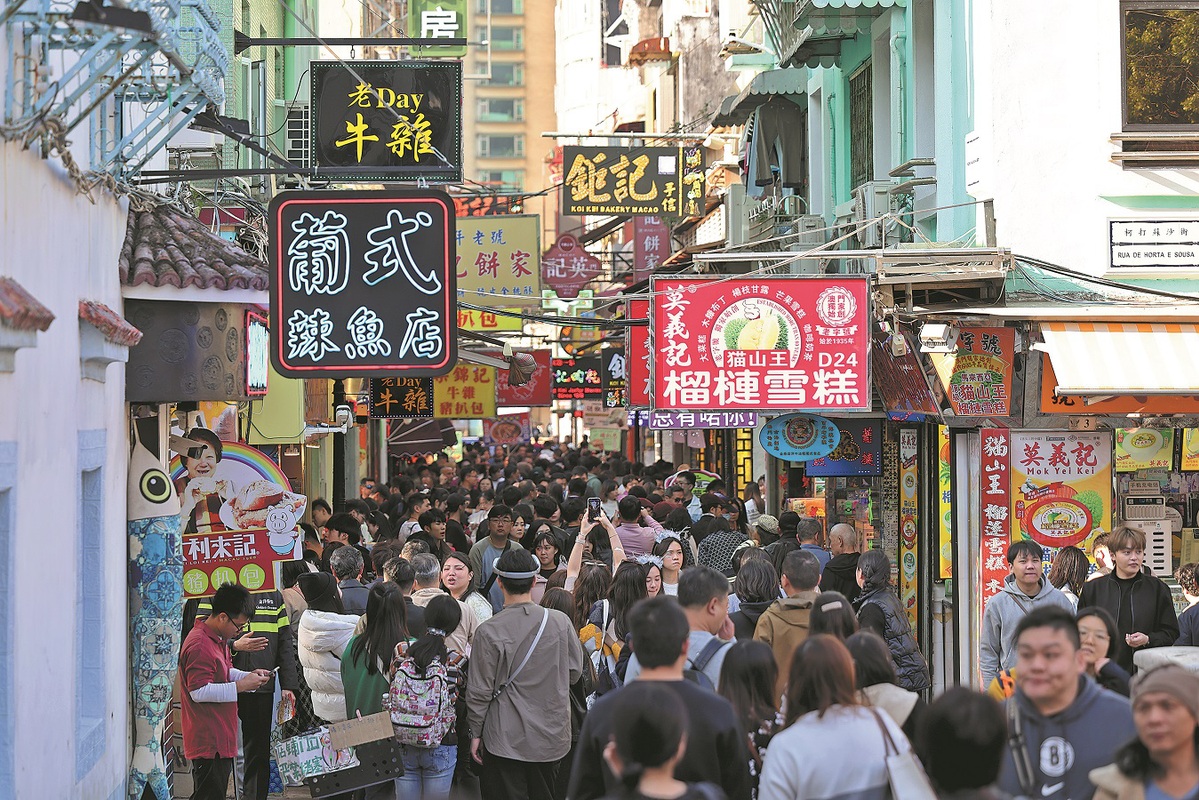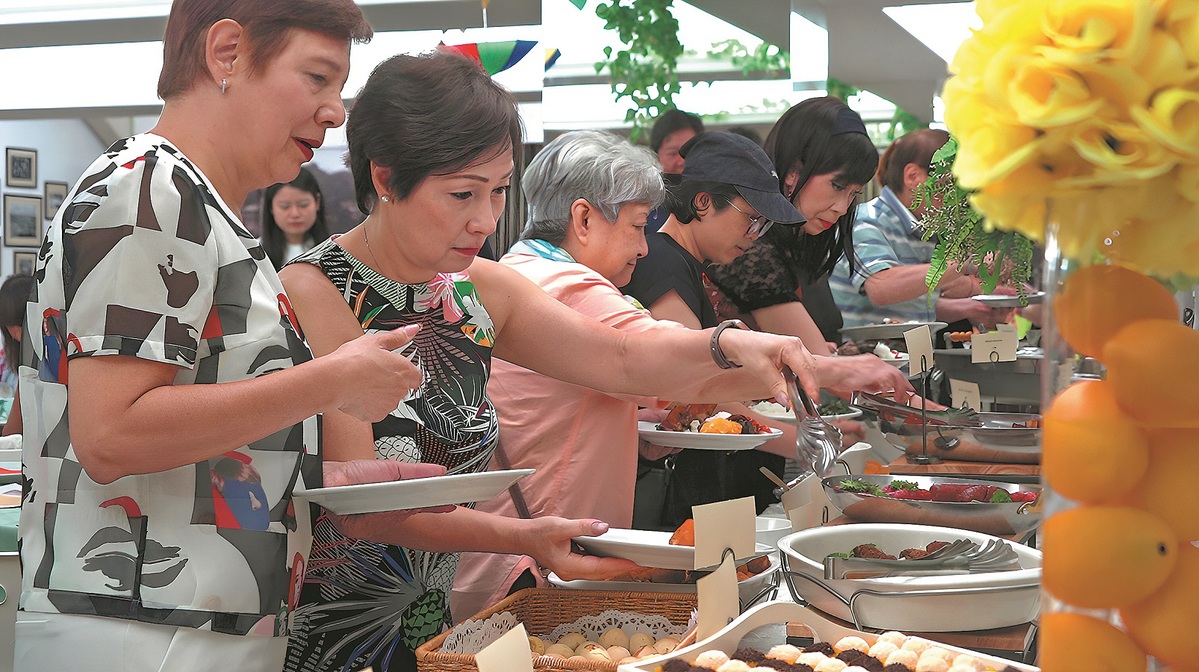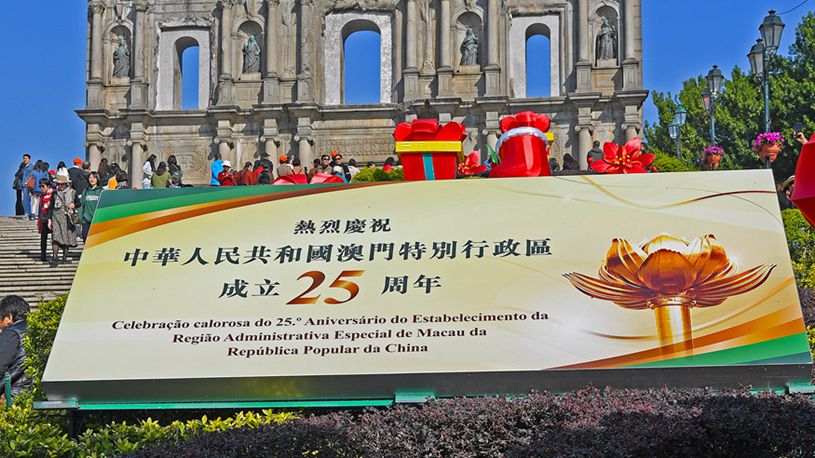Macao's fusion flavors shine

Tourists visit Rua do Cunha to find local cuisine in Macao on Tuesday. (Feng Yongbin/China Daily)
Macanese chef Palmira Pena is in the kitchen preparing a classic dish, "Minchi". Palmira has started cooking the essential ingredients: minced pork and beef. The enticing aromas fill the air as she chops onions and garlic for seasoning and fries diced potato in oil.
Once everything is ready, she begins to blend her aunt's traditional secret recipe, which artfully combines Eastern and Western seasonings. "This is my family's secret recipe," she said, adding that it is also the "key to the deliciousness of this dish".
Palmira, the daughter of a Portuguese father and mother who hails from Zhuhai, Guangdong, owns a restaurant in Taipa, Macao. She takes pride in her heritage and eagerly steps into the kitchen whenever diners express a desire to experience authentic Macanese dishes.
According to Palmira, the essence of Macanese cuisine lies in its remarkable fusion. This culinary style combines Portuguese and Chinese influences, integrating seasonal ingredients and spices sourced from Europe, South America, Africa, and Southeast Asia. The result is a rich tapestry of flavors that reflects the diverse history and cultural intersections of Macao.
"Macanese cuisine is the world's first fusion cuisine. Its uniqueness lies in combining Eastern and Western ingredients; for instance, I use olive oil alongside Chinese rice wine. I prefer cooking with an iron wok because I admire Chinese culinary techniques and enjoy steaming hot food prepared in it. This dish beautifully blends Eastern and Western cultures," she said.

A meal gathering with the Macanese community takes place at the Macanese Association in Macao on July 20. (Li Xiang/China Daily)
Story of Macanese cuisine
Following Macao's return to the motherland in 1999, both the central and Macao Special Administrative Region governments have prioritized protecting cultural heritage and preserving local diversity.
The fifth Chief Executive of the Macao SAR, Ho Iat-seng, emphasized the vital role of the Macanese community in Macao's population.
He affirmed that the Macao SAR government will support the community's development. Ho also underscored the government's commitment to respecting the Macanese people's language, culture, customs, and religious beliefs, ensuring that their unique and cherished heritage will continue to thrive in Macao.
The story of Macanese cuisine dates back to the Age of Exploration, when, from the 15th century onward, Portuguese sailors embarked on ambitious voyages. These adventurers navigated the west coast of Africa, rounded the Cape of Good Hope, and sailed through the Indian Ocean and the Strait of Malacca, ultimately landing in Macao.
Longing for the familiar flavors of home, they blended ingredients from Portugal with local produce and those gathered during their travels, creating dishes that evoked memories of their homeland.
The term "Macanese cuisine "highlights this unique blend of Chinese and Western flavors originating from Macao. UNESCO has recognized Macanese cuisine as the world's first fusion cuisine.
Otilia Rodrigues Novo, a young Macanese chef, is reproducing the traditional dish "Capela", enjoyed by locals after Christmas Mass. Traditionally large and greasy, Otilia has transformed it into an elegant single-serving meal.
She enhances the flavor with Southeast Asian ingredients like sour tamarind and orange juice, balancing the richness of the pork and beef with a sweet and tangy twist. While traditional Macanese dishes are simply presented, Otilia adds vibrant fruits and herbs for a refined touch.
Otilia sees the kitchen as a laboratory where art and science converge, allowing her to express her creativity. "Today's consumers have high expectations for food, focusing on color combinations, rich textures, and the aesthetic appeal of plating. Even lesser-known Macanese dishes can be transformed into exquisite, high-end cuisine. As a Macanese chef, I take great pride in this," she said.
In Macao, visitors can explore the old streets for traditional flavors or dine at Michelin-starred restaurants in the vibrant city. As a "World Center of Tourism and Leisure", Macao has seen a surge in visitors thanks to its unique attractions, comprehensive facilities, and a "1+4" appropriately diversified development strategy.
With Macao's rising popularity, Otilia feels energized. "More and more visitors from around the world are coming to Macao. As a Macanese, I feel a strong urge to promote our cuisine, blending modern creativity with traditional essence for guests from all corners of the globe."
Recipes not shared
When it comes to Macanese cuisine, one classic dish that stands out is "minchi".
Miguel de Senna Fernandes, president of the Macanese Association, smiles as he notes that every Macanese family has its unique way of preparing it. "As a result, they often argue about it, with everyone convinced that their family's version is the best in the world."
In Macanese households, recipes are cherished and closely guarded. For generations, these recipes have been passed down within families, rarely shared with outsiders.
"Macanese recipes were traditionally kept within families and seldom shared publicly, making preservation challenging and putting some recipes at risk of being lost," Otilia said.
Since Macao's return to the motherland in 1999, the protection of cultural heritage has become increasingly important.
In 2012, Macanese gastronomy was recognized as part of Macao's Intangible Cultural Heritage, becoming a national project in 2021. In 2020, the Macanese Cuisine Database was launched to promote this unique food culture.
"Since Macao's return, the SAR government has been promoting and preserving Macanese cuisine," Otilia noted. "The government has published many books on Macanese cuisine and created a dedicated database for its dishes. This initiative helps more people discover the richness of Macanese culinary traditions and ensures that this 400-year-old heritage will continue to be preserved and developed."
Photos
Related Stories
Copyright © 2024 People's Daily Online. All Rights Reserved.









